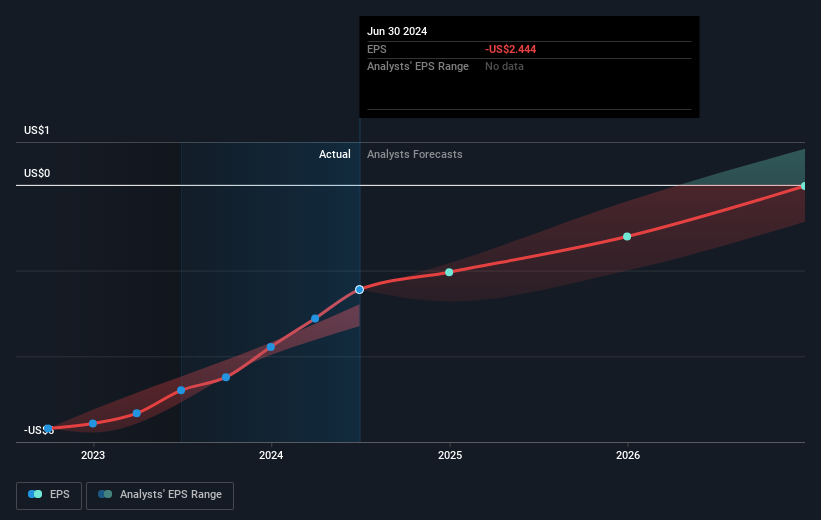
We feel now is a pretty good time to analyse Natera, Inc.'s (NASDAQ:NTRA) business as it appears the company may be on the cusp of a considerable accomplishment. Natera, Inc., a diagnostics company, develops and commercializes molecular testing services worldwide. The US$15b market-cap company posted a loss in its most recent financial year of US$435m and a latest trailing-twelve-month loss of US$292m shrinking the gap between loss and breakeven. Many investors are wondering about the rate at which Natera will turn a profit, with the big question being “when will the company breakeven?” We've put together a brief outline of industry analyst expectations for the company, its year of breakeven and its implied growth rate.
See our latest analysis for Natera
Consensus from 18 of the American Biotechs analysts is that Natera is on the verge of breakeven. They anticipate the company to incur a final loss in 2025, before generating positive profits of US$15m in 2026. So, the company is predicted to breakeven approximately 2 years from today. What rate will the company have to grow year-on-year in order to breakeven on this date? Using a line of best fit, we calculated an average annual growth rate of 71%, which is extremely buoyant. Should the business grow at a slower rate, it will become profitable at a later date than expected.

Given this is a high-level overview, we won’t go into details of Natera's upcoming projects, though, bear in mind that generally biotechs, depending on the stage of product development, have irregular periods of cash flow. This means, large upcoming growth rates are not abnormal as the company is beginning to reap the benefits of earlier investments.
Before we wrap up, there’s one issue worth mentioning. Natera currently has a relatively high level of debt. Generally, the rule of thumb is debt shouldn’t exceed 40% of your equity, which in Natera's case is 44%. A higher level of debt requires more stringent capital management which increases the risk around investing in the loss-making company.
Next Steps:
This article is not intended to be a comprehensive analysis on Natera, so if you are interested in understanding the company at a deeper level, take a look at Natera's company page on Simply Wall St. We've also put together a list of key aspects you should further examine:
- Valuation: What is Natera worth today? Has the future growth potential already been factored into the price? The intrinsic value infographic in our free research report helps visualize whether Natera is currently mispriced by the market.
- Management Team: An experienced management team on the helm increases our confidence in the business – take a look at who sits on Natera’s board and the CEO’s background.
- Other High-Performing Stocks: Are there other stocks that provide better prospects with proven track records? Explore our free list of these great stocks here.
Valuation is complex, but we're here to simplify it.
Discover if Natera might be undervalued or overvalued with our detailed analysis, featuring fair value estimates, potential risks, dividends, insider trades, and its financial condition.
Access Free AnalysisHave feedback on this article? Concerned about the content? Get in touch with us directly. Alternatively, email editorial-team (at) simplywallst.com.
This article by Simply Wall St is general in nature. We provide commentary based on historical data and analyst forecasts only using an unbiased methodology and our articles are not intended to be financial advice. It does not constitute a recommendation to buy or sell any stock, and does not take account of your objectives, or your financial situation. We aim to bring you long-term focused analysis driven by fundamental data. Note that our analysis may not factor in the latest price-sensitive company announcements or qualitative material. Simply Wall St has no position in any stocks mentioned.
About NasdaqGS:NTRA
Natera
A diagnostics company, develops and commercializes molecular testing services worldwide.
Excellent balance sheet with reasonable growth potential.

